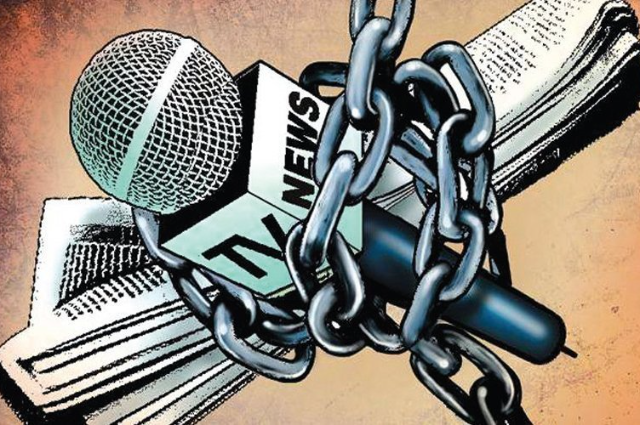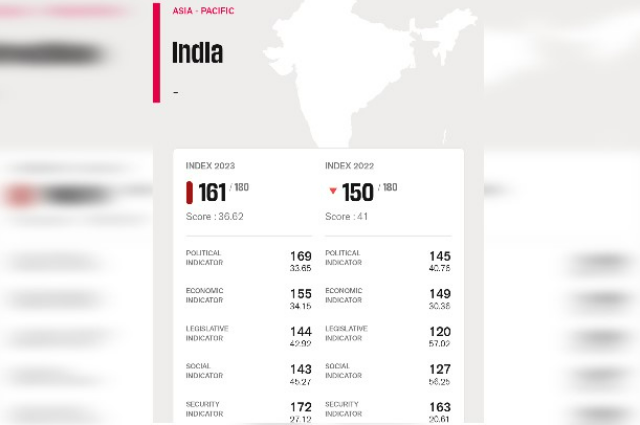
Source: Development News
"The expression “freedom of the press” has not been used in Article 19 but it is comprehended within Article 19 (1) (a). The expression means freedom from interference from an authority which would have the effect of interference with the content and circulation of newspapers. Freedom of the press is the heart of social and political intercourse. It is the primary duty of the courts to uphold the freedom of the press and invalidate all laws or administrative actions which interfere with it contrary to the constitutional mandate"
The apex court of the land pronounced these statements while hearing the famous case Ramesh Thoppar vs the State of Madras. The case showcased the significance of independent media in a truly democratic nation. It is the freedom that allows the press to bring to the common citizen the failings that are committed by people who serve in the echelons of governance. The freedom of the press extends not only to the content that is published and propagated but also to the volume of information that is to be circulated. In the course of several decades, since the Constitution was adopted, the Supreme Court has always acted in a manner that tried to shelter the rights of the press, and several landmark judgments in this respect are a testimony to the earnest effort of the Court. Ramesh Thoppar case was not only the odd one which dealt directly with the rights of an independent press, there are some important other cases which also upheld the inevitable role of media for the robust function of a democratic nation.
Media is often considered to be the fourth estate of democracy. An independent unbiased media can only function as a link between the people and the government exposing the manner of governance and alerting the wrong policies. Unfortunately, whenever media are trying to uncover stories which may consist of criticism of government policies, it gets tapped on the ground of security issues and public order. Due to the growing tendency that it will be banned in the name of security issues, the media do not tend to report much news that unveils any negative sides of government policies. When media become getting paid or violated its freedom on the ground of loopholes (Provided by law ) or any draconian law itself, it becomes unworthy and unreliable. Therefore, independent and unbiased media which do not rely on anything must be operated throughout a democratic state to stand as a bridge between the people and its governance.
India, as it is said, is The biggest Democratic country and the biggest market in the fourth pillar of democracy with over 82237 newspapers and more than 900 televisions news channels running all over India in different languages and these numbers are still counting day by day, has a great responsibility to ensure media freedom. Whether India has accomplished its responsibility of not letting the fourth estate of democracy distract and upholding its values and positions as a democratic country?
Some incidents and reports shed light on the status of media freedom in India.

Image by Mohamed Hassan from Pixabay
Telecast ban is on the boil
On Feb 14, 2022, The BBC offices in both Delhi and Mumbai witnessed a great ride by an income tax on the name of "survey action". The press club of India condemned the ride as "deeply unfortunate". The three days- long ride was carried out almost one month after the publication of the documentary by BBC in the U.K. India: The modi question which is highly aired all over the world except in India as it's banned following an "emergency secrete order" by the Ministry of electronics and information technology to block it's web link. The documentary was consistent with the role of India's prime minister in the Gujarat riot and thus it's considered "anti-national" and adverse effect on integrity. Even though it's not thoroughly a telecast ban, the blockade of a documentary published by media also comes under the purview of constraints on media freedom.
The recent telecast ban on media is another instance. In a petition filed by Madhyam Broadcasting Ltd against the Union government of India, the apex court held that critical views of the channel against government policies cannot be termed as anti-establishment as an independent press is necessary for a robust democracy.
These incidents incite the hazardous nature of the growing telecast ban and its consequences on a healthy democracy. In the case, Indian Express vs Union of India, The Supreme Court gave an extension to the definition of freedom of expression under Article 19(2) stating that
The expression means freedom from interference from an authority, which would have the effect of interference with the content and circulation of newspapers. There cannot be any interference with that freedom in the name of public interest”
This judgment lashes out at the growing telecast ban as an unconstitutional mechanism to curb the freedom of media.
Media are not destined to favour any private or partial interest or to stand with any groups irrespective of political or non-political. Media must be operated through its unwavering logic such as unbiased, fearless and fair able. Those telecast bans when it's working on these straightways must be condemned and eliminated on reasonable grounds made by sanctions.

Source: Global press freedom index published by RSF
What reports allude
India has been ranked 161st among the 180 countries with a score of 36.62 in the latest Press Freedom Index released on world press freedom day May 3. The index published by Reporters Without Borders (RSF) is ranking the nations based on the increased violence against journalists and politically partisan media. It's apparently understandable that India's position has been consistently falling in the index since 2016 when it was ranked 133. The report and the rank assigned to India demonstrate the prevailing status of an independent media in the largest democratic nation.
The phenomenon that dangerously restricts the free flow of information which differs from a telecast ban to the acquisition of media outlets by oligarchs who maintain close ties with political leaders is the basic reason behind the underside rank given to India. The Reliance Industries group led by Mukesh Ambani, now a personal friend of PM Modi, owns more than 70 media outlets that are followed by at least 800 million Indians. Similarly, the takeover of the NDTV channel at the end of 2022 by tycoon Gautam Adani, who is also very close to Narendra Modi, signaled the end of pluralism in the mainstream media
Besides, The Reporters organisation also asserts that many journalists in India are forced to censor themselves due to extreme pressure.
Not only the press freedom index released by RSF displays the impediments media are facing in India to function independently, but there are also various other reports in front which unleash numerous existing threats faced by Medias in India.
Amnesty International in its annual report "The State of the World's Human Rights" has accused India of using money laundering laws and other pretexts to harass media organisations and Non-Governmental Organisations in the country.
While India has been trying to forge itself as a "Mother of democracies" or "Vishwa Guru" in international matters, these reports and condemnations make the state’s endeavour in vain.
Steps ahead
On April 6, 2023, India witnessed another warp to democratic values notifying new amendments to IT Act ( Intermediary Guidelines and digital media ethics code) 2021 under the Meity (Ministry of Electronics and information technology). Among the various amendments the most alarming and frightening one was the establishment of FCU (Fact check unit) formed at the sole discretion of union government aimed to check fake news related to the government of India. In a critical period of telecast ban on the ground of national security and interest, often proved to be insufficient, this establishment gives a hand to the ruling government to curb and prevent every striking news and it's channels against the government without any constitutional limitations. It violates not only the natural justice, wherein one can’t be the “judge in their own cause”, but also poses a huge threat to online free speech and the right to receive information online. The Constitution itself clearly ensures right to freedom of speech and expression as well as horizontally (Against the state) as enshrined in Article 19(1). However, there are some reasonable restrictions which can be imposed on Article 19(1)(a) which is described in Article 19 (2). These restrictions could be employed whenever the news are adversity affecting the security, sovereignty or friendly relationship with the neighbours. Whereas the establishment of FCU is being reckoned to be a tip-off that the independence of media is going to be phased out from the land of the world's largest democratic country. Therefore this establishment must be judicially reviewed or amended without affecting any of the constitutional provisions. Otherwise the civil liberties will be obliterated with this new amendment to IT Act.
As a nation with great democratic values and often it's ground nun the constitution stood even as a tradition breaker ( In matters of untouchability) and must stay aloof from draconian laws which curtail the freedom of the fourth pillar of Democracy. Telecast ban on the ground of national security, interest or sovereignty must not be imposed on without reasonable restrictions as stipulated in Article 19(2). To ensure the imposition of these restrictions are on the reasonable ground, an official body or committee can be formed to perform as a platform to probe the ban is not violative of the constitution. In Norway, Ireland and Denmark, (Which occupied three top ranks in Press Freedom Index) media are operating very independently and their freedoms are guaranteed by numerous Legal frameworks. According to data, By and large, Norwegian politicians refrain from labeling unfavourable coverage as a ‘fake news” and from disparaging its authors. Parliamentarians and government ministers avoid approaching the editorial boards of publications subsidised by public bodies. Beyond all these, these countries have reported very lass death rate and constraints of journalists.
Russian invasion of Ukraine and Afghanistan's takeover by the Taliban, both have significantly brought challenges to the accountability and transparency of Media throughout the world. Ireland has hosted international and national councils and conventions to ensure the freedom assigned to media.
Media has played a vital role in reducing the subjugation, expurgation, and physical punishment practiced by dictators to remain in power exposing it to the public. Nowadays, especially when democratic values are being tarnished, independent media is reckoned to be subservient and vigilant to help the citizens get away from the grip of tyrannical rulers.
